At Austin MLK March, Activists Implore Crowd to Continue Fight for Racial Justice
By Corey Smith
Reporting Texas
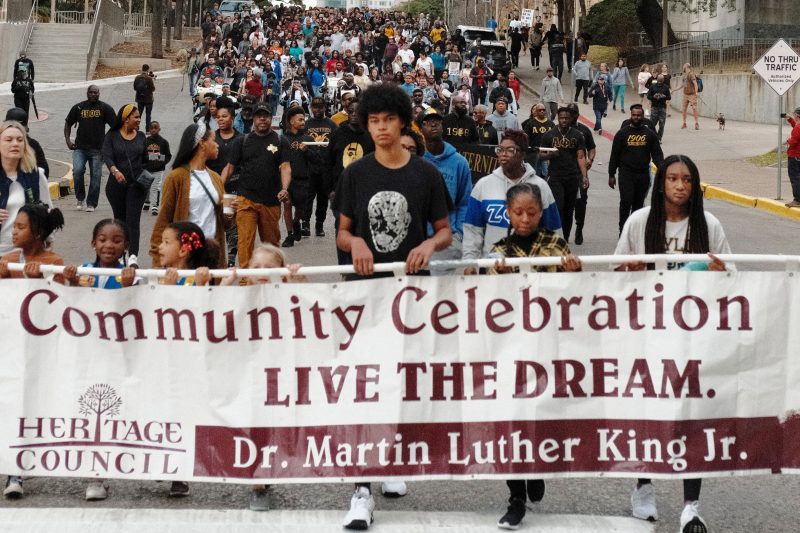
Attendees of the 2023 MLK Community March walk from the University of Texas campus toward the state Capitol on Jan.16, 2023, in Austin, Texas. Ry Olszewski/Reporting Texas
Hundreds of community members, activists, students and several state politicians marched from the Rev. Martin Luther King Jr. statue on the University of Texas at Austin campus through the state Capitol grounds to historically Black Huston-Tillotson University in East Austin Monday.
Many of the attendees of the annual Martin Luther King Jr. Day march said they were there not only to honor King’s legacy, but also because there is much work left to be done when it comes to ending racial injustice.
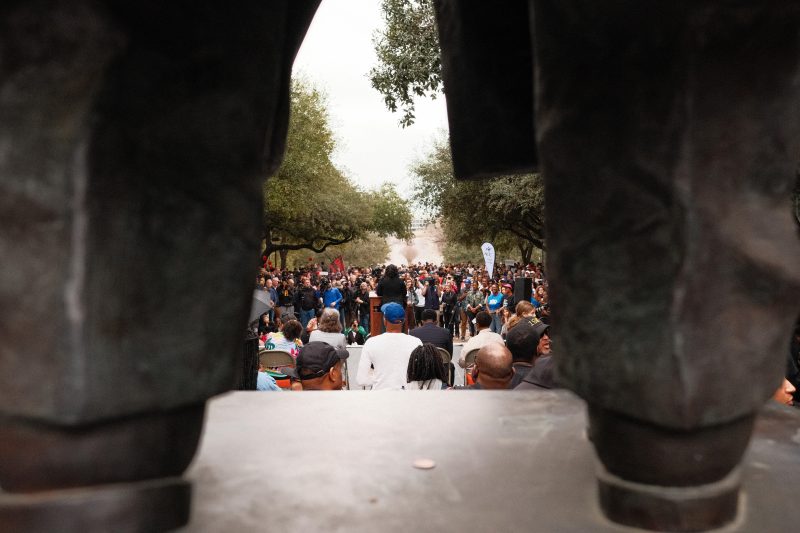
Framed by the shoes of the Rev. Martin Luther King Jr. statue on the University of Texas at Austin campus, the crowd listens to speakers as they kick off the 2023 MLK Community March. Ry Olszewski/Reporting Texas
“We’ve come a long way … but we have more work to do,” said Para Agboga, the volunteer coordinator for the Austin Area Heritage Council, which has organized the march since its 1993 debut.
“I think what we do is so vital to the recognition of not only the work of civil rights, the work that’s been done in the past, but also the work that has to be done,” Agboga added.
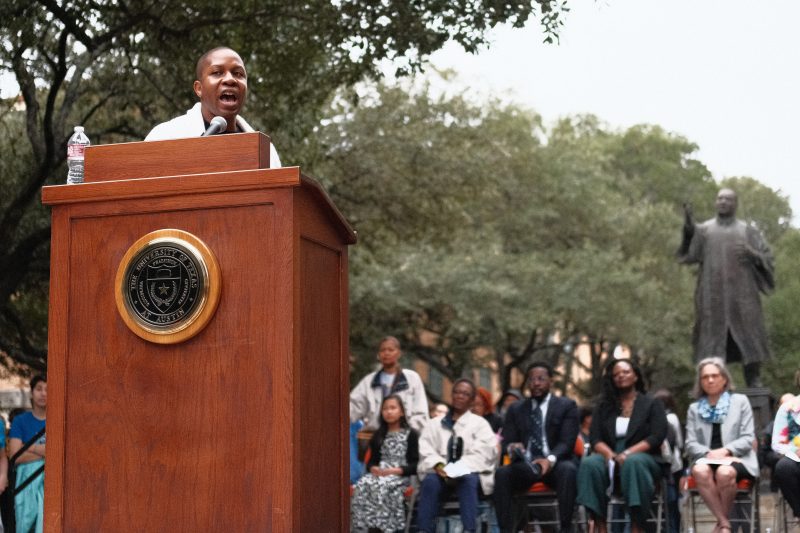
Pflugerville City Council Member Rudy Metayer speaks at the celebration honoring the Rev. Martin Luther King Jr. at the University of Texas campus. Ry Olszewski/Reporting Texas
Pflugerville City Council Member Rudy Metayer addressed the crowd near the statue of King on the UT campus and urged them to continue the fight for racial justice after the march. “Allyship is fine, but what we really need is people that are co-conspirators.”
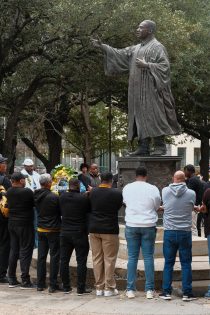
Members of the Alpha Phi Alpha fraternity Austin chapter sing a traditional hymn at the base of the Rev. Martin Luther King Jr. statue as part of the celebration. King was a member of the fraternity’s Boston Sigma chapter while he was enrolled at Boston University. Ry Olszewski/Reporting Texas
“You need people on the front lines who represent your values,” Metayer said. “People who understand the greatness of this country, while also acknowledging its flaws.”
Metayer and several of the activists in attendance said it’s as important as ever to support anti-racist initiatives.
Dozens of members of the Austin Justice Coalition attended the march. The coalition formed in 2016 after an Austin Police Officer killed 17-year-old David Joseph while he was naked and unarmed at an apartment complex in East Austin.
One of the group’s goals is to end the so-called school-to-prison pipeline — discipline policies that disproportionately push children of color out of the classroom and into the criminal justice system, said Amber Watts, Austin Justice Coalition education policy manager.
“Dr. King had huge visions of us coming together, especially those of us who are considered marginalized, those of us who are oppressed, Black people, Brown people, people who are considered poor,” Watts said.
Several members of the Texas Center for Justice and Equity, a non-profit organization working to combat racist policing and mass incarceration, set up a booth on the campus of Huston-Tillotson near the end of the event.
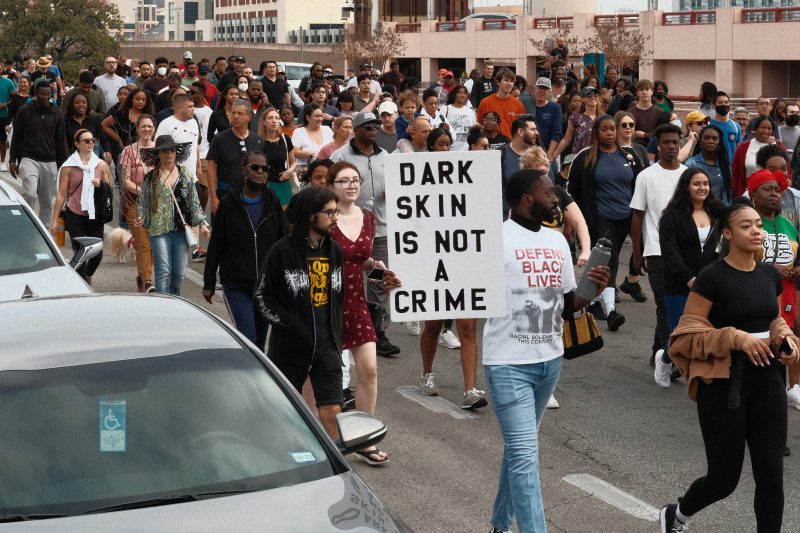
Attendees of the march head down San Jacinto Boulevard toward the state Capitol. Ry Olszewski/Reporting Texas
“A lot of people have a connotation that those who commit a crime deserve what they get,” said Sarah Reyes, a policy analyst with the Texas Center for Justice and Equity. Part of her organization’s mission is to put an end to that mindset, if not otherwise reverse adverse conditions for incarcerated people, particularly youth, through research, policy advocacy at the Texas Legislature and public awareness campaigns.
Members of the organization carried signs that read “Finish the Five,” a nod to the group’s goal to close the five juvenile justice facilities in Texas. African-American youth are disproportionately locked up in youth prisons in Texas and around the nation — Black youth are more than four times as likely to be detained or committed to juvenile detention facilities compared to their white peers, according to 2021 figures from The Sentencing Project.
In Texas, scandals, including sexual abuse and violence, have plagued youth prisons for decades.
State Rep. James Talarico (D-Round Rock) attended the MLK day event in solidarity with the Texas Center of Education and Justice. “I’m marching with activists to protest the human rights abuses in Texas youth prisons,” Talarico wrote on Twitter. “Dr. King devoted his life to the most marginalized members of our community. If he were alive today, I think he would be marching alongside us.”
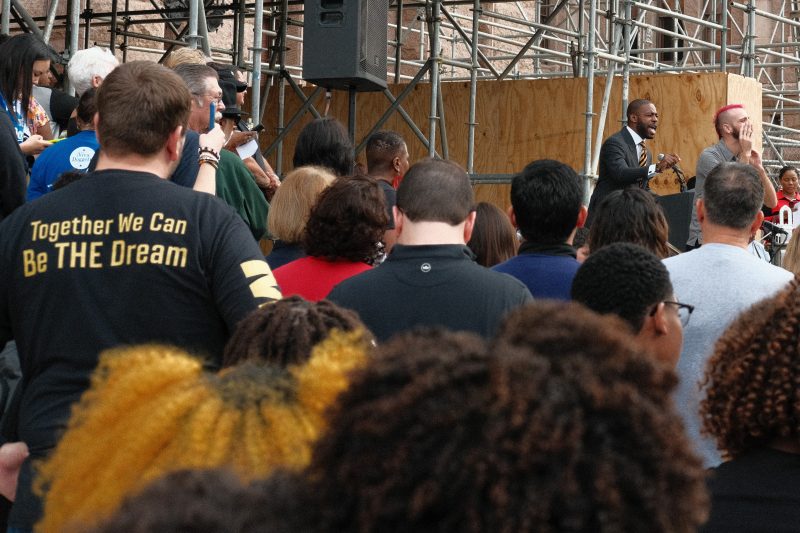
Pastor Laurent Grosvenor of the Alpha SDA Church speaks from the Capitol steps during one of the stops of the march. Ry Olszewski/Reporting Texas
Several speakers addressed the crowd from the south steps of the Capitol building, which is undergoing renovations and was surrounded by construction scaffolding.
“We almost thought we weren’t going to be able to have the program because we weren’t going to have a space to be able to do it,” Austin Area Heritage Council member Joya Hayes said. “I want you to know that our community is under construction,” Hayes said.
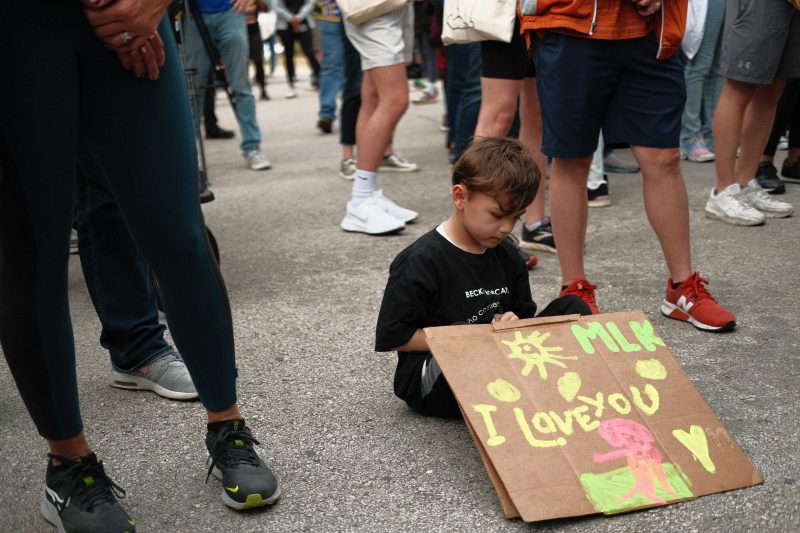
Oscar Tufton sits with the sign he made at the Capitol, one of stops of the MLK Community March. Ry Olszewski/Reporting Texas
Hayes urged the crowd to continue the fight for racial justice beyond simply attending a march on MLK day. “This must be a life decision that we are going to guarantee that we are heard, that we are respected, and the things that need to happen to prosper our community take place.”